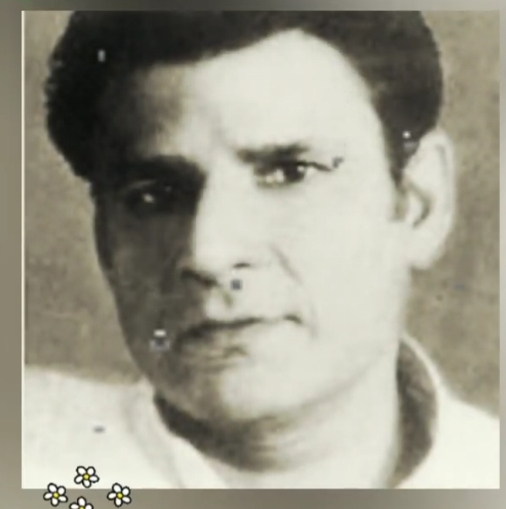
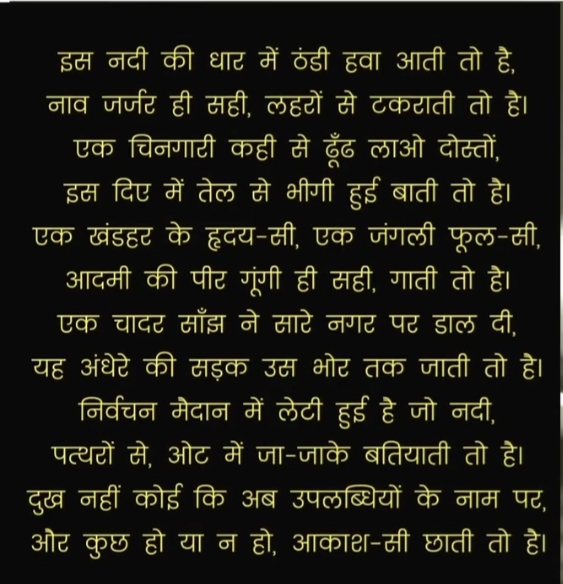
“Ho Gayi Hai Peer Parvat-Si”: A Tribute to Dushyant Kumar on His 92nd Birth Anniversary
“Ho gayi hai peer parvat-si, pighalni chahiye, Is Himalaya se koi ganga nikalni chahiye” (The pain has become like a mountain, it must melt, From this Himalaya, some Ganga must flow)
On this 1st of September 2025, as we mark the 92nd birth anniversary of Dushyant Kumar Tyagi, the immortal lines of his revolutionary ghazal echo through time, stirring hearts with their call for change.
Born in 1933 in the rustic hamlet of Rajpur Nawada, Bijnor, Uttar Pradesh, Dushyant Kumar emerged as a poetic force whose words became the anthem of the common man, a voice that challenged the status quo and kindled the fire of resistance. His life, though brief, left an indelible mark on Hindi-Urdu literature, and his legacy continues to inspire generations.
Today, we celebrate the poet whose verses remain as relevant as ever, a blazing reminder that “aag jalni chahiye”—the fire must burn.
Main Jise Odhata Bichhaata Hoon:
The Weaver of Words
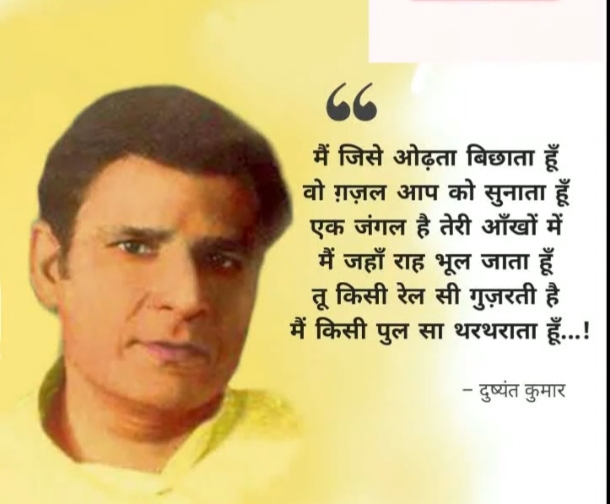
“Main jise odhata bichhaata hoon, Vo ghazal aap ko sunaata hoon” (Whatever I cover myself with, I recite that ghazal to you)
Dushyant Kumar Tyagi, born into a modest family in Bijnor, carried the weight of his roots into his poetry. From his early days in the tenth grade, he began weaving words into verses that captured the pulse of human emotions—love, loss, and rebellion.
At Allahabad University, where he pursued an MA in Hindi, his craft found new depth, blending the lyrical grace of ghazals with the sharp edge of social critique. His pen name, Dushyant Kumar Pardeshi, hinted at his identity as a wanderer, a poet who roamed the landscapes of the heart and society, giving voice to the unspoken.
His works, including Saaye Mein Dhoop (Sunlight in the Shade), Ek Kanth Vishpayi, and Mann Ke Kon, published in 1963, are treasures of modern Hindi literature. Dushyant’s ghazals, distinct for their accessibility and emotional resonance, broke away from the ornate complexity of traditional Urdu poetry.
He drew inspiration from stalwarts like Firaq Gorakhpuri, yet carved a unique niche with his clarity and directness.
His couplets, often laced with metaphors of fire, trains, and jungles, spoke to both the romantic and the revolutionary, making him a poet of the masses.
Tu Kisi Rail Si Guzarti Hai: A Love That Trembles Like a Bridge
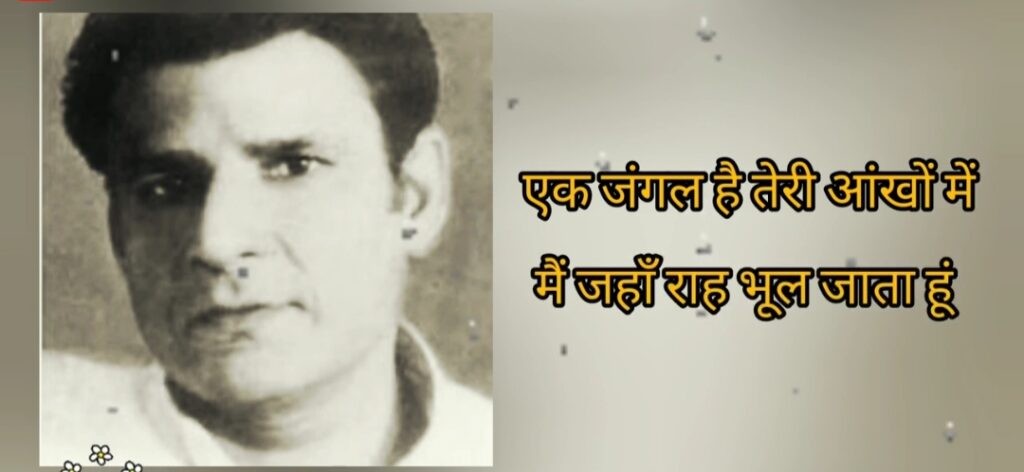
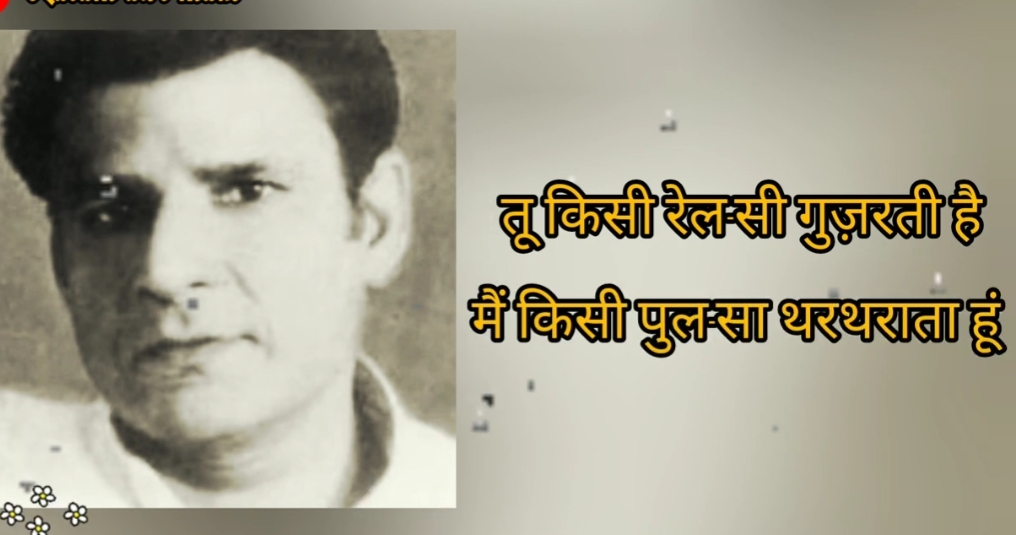
“Tu kisi rail si guzarti hai, Main kisi pul sa tharatharaata hoon” (You pass by like a train, I tremble like a bridge)
Dushyant’s poetry was not confined to protest; it was equally a tender exploration of love and longing. His lines, such as those immortalized in the 2015 film Masaan—“Tu kisi rail si guzarti hai”—capture the fleeting, trembling nature of love. Lyricist Varun Grover, who incorporated Dushyant’s poetry into Masaan, noted that the poet’s verses resonated with the millennial and Gen X penchant for Hindi poetry as an expression of love, a hobby rarely depicted in Bollywood’s glossy frames. In Masaan, the character Shaalu, played by Shweta Tripathi, embodies this love for poetry, reciting Dushyant’s lines to weave her emotions into the narrative, proving his words’ timeless appeal.
His personal life, though less documented, was anchored by his marriage to Rajeshwari Tyagi, a partnership that provided a quiet backdrop to his fiery creative output. His ability to balance the personal and the political—love’s intimacy and society’s injustices—made his work universal, a bridge trembling under the weight of human experience.
Mere Seene Mein Nahin To Tere Seene Mein Sahi:
The Fire of Resistance
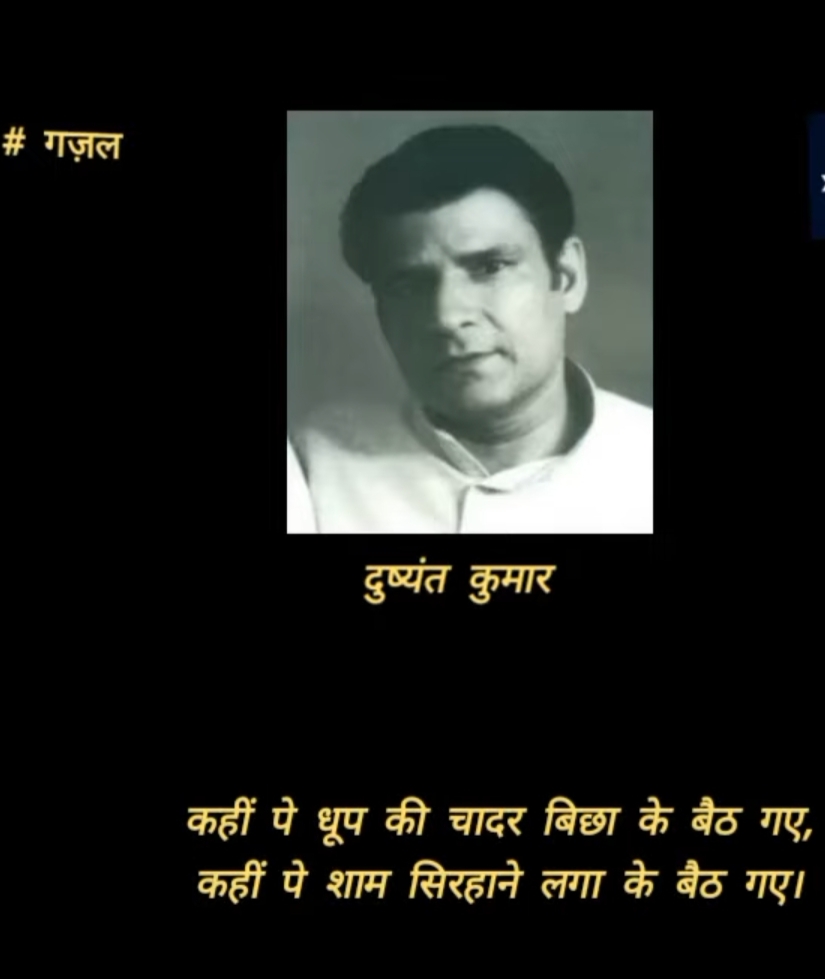
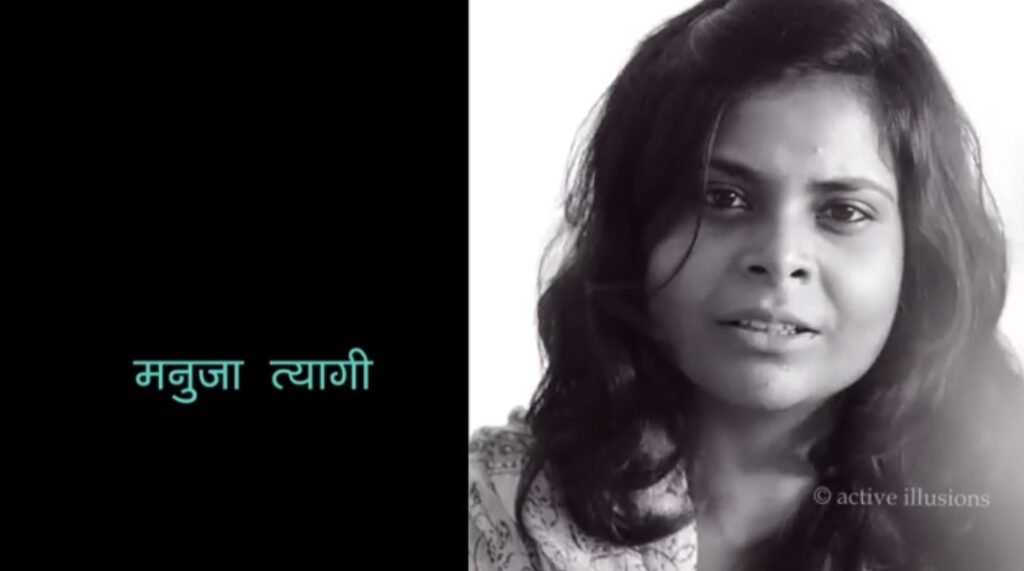
“Mere seene mein nahin to tere seene mein sahi, Ho kahin bhi aag, lekin aag jalni chahiye” (If not in my heart, then in yours, Fire may be anywhere, but it must burn)
Dushyant Kumar’s poetry was a clarion call during turbulent times. His iconic ghazal, Ho Gayi Hai Peer Parvat-Si, became a rallying cry during the 2011 Indian anti-corruption movement, with protestors singing its lines to galvanize the masses. The poem’s imagery of pain as towering as the Himalayas and the need for a Ganga of change to flow spoke directly to a nation yearning for justice. Similarly, lines from Saaye Mein Dhoop—“Sirf hungama khada karna mera maqsad nahin,
Saari koshish hai ki yeh soorat badalni chahiye” (My aim is not merely to create a commotion,
All my efforts are to change this situation)—were adopted by Star Plus for Satyamev Jayate, Aamir Khan’s show advocating social reform. These verses, also featured in the film Halla Bol, underscore Dushyant’s role as a poet of conscience, urging society to ignite the fire of change.
His revolutionary spirit was not without cost. His anti-establishment stance often placed him in the spotlight of controversy, as he noted: “Har taraf aitraaz hota hai,
Main agar raushnee mein aata hoon” (There is objection everywhere,
If I come into the light). Yet, he persisted, carrying the weight of his convictions, as he wrote: “Ek baazoo ukhad gaya jab se,
Aur zyada vazan uthaata hoon” (Ever since one of my arms got dislocated,
I carry more weight).
Yeh Soch Kar Ki Darakhton Mein Chhaanv Hoti Hai: A Legacy Preserved
“Yeh soch kar ki darakhton mein chhaanv hoti hai, Yahan babool ke saye mein aa ke baith gaye” (Thinking that trees have shade, We came and sat in the shade of an acacia)
Dushyant’s legacy is preserved not only in his words but in tangible tributes. In 2009, the Indian Department of Posts honored him with a commemorative stamp, recognizing his contribution to Hindi literature. The Dushyant Kumar Memorial Manuscript Museum in C.T.T. Nagar, Bhopal, stands as a testament to his enduring influence, housing artifacts like a letter he wrote praising a young Amitabh Bachchan. However, the demolition of his Bhopal home for the Smart City Project in 2017 sparked outrage, with critics and poets decrying the loss of a cultural landmark. The subsequent promise by authorities to relocate the museum reflects the public’s fierce attachment to his memory.
Nazar-Navaaz Nazara Badal Na Jaye Kahin: A Timeless Relevance
“Nazar-navaaz nazara badal na jaye kahin,
Zara si baat hai, munh se nikal na jaye kahin”
(The sight that pleases our eyes may change,
It is a small thing, it may slip out of our mouth)
At 42, Dushyant Kumar’s life was cut short on December 30, 1975, in Bhopal, but his words remain a living force.
His ghazals, featured in films like Irada (2017), which used Ho Gayi Hai Peer Parvat-Si to highlight environmental crises in Punjab, continue to resonate with contemporary issues.
The 2016 Mahakavi episode on ABP News, celebrated his contributions, ensuring his voice reached new audiences. His ability to blend the lyrical with the revolutionary ensures that his poetry remains a nazar-navaaz nazara—a sight that captivates and challenges.
On this 92nd anniversary of his birth, we honour Dushyant Kumar, whose ghazals are both a jungle where we lose ourselves and a fire that refuses to die. His words, like a train passing through the heart, continue to make us tremble, urging us to keep the flame of change alive.
As we recite his verses, we are reminded: “Kaun yeh faasala nibhaega,
Main farishta hoon, sach bataata hoon” (Who will maintain this distance,
I am an angel, I tell you the truth). In Dushyant’s truth, we find our own.
Hasnain Naqvi is a former member of the history faculty at St. Xavier’s College, Mumbai
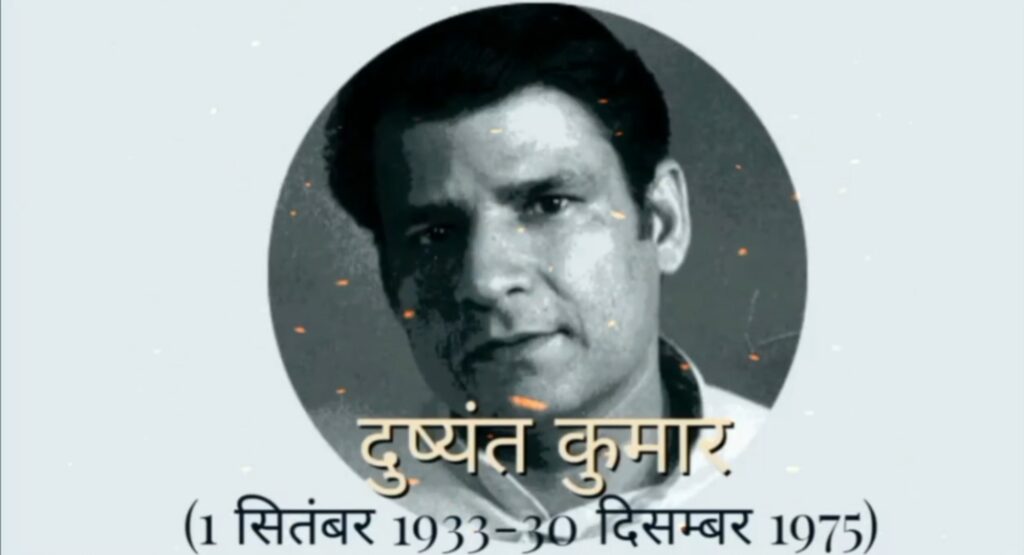
ALL PICTURE CREDIT SOCIAL MEIDA


